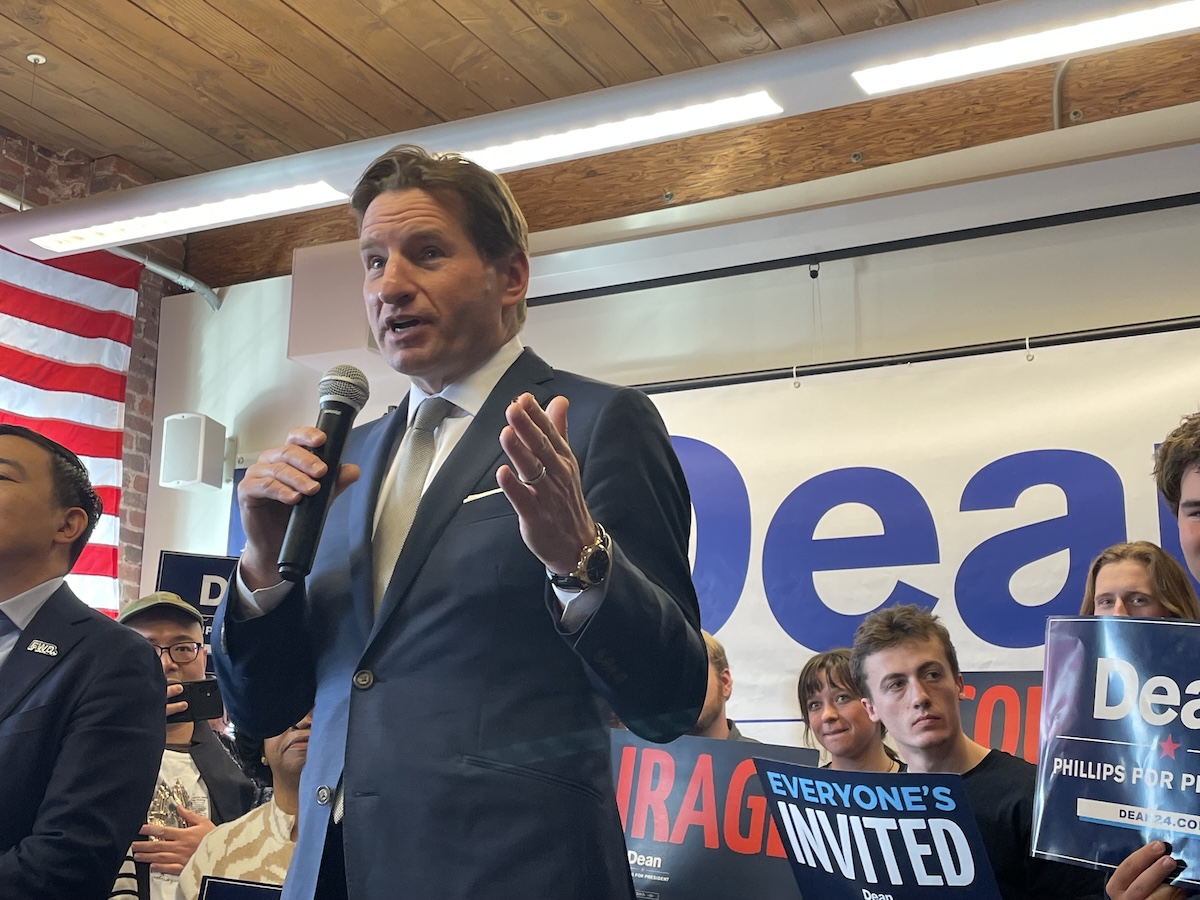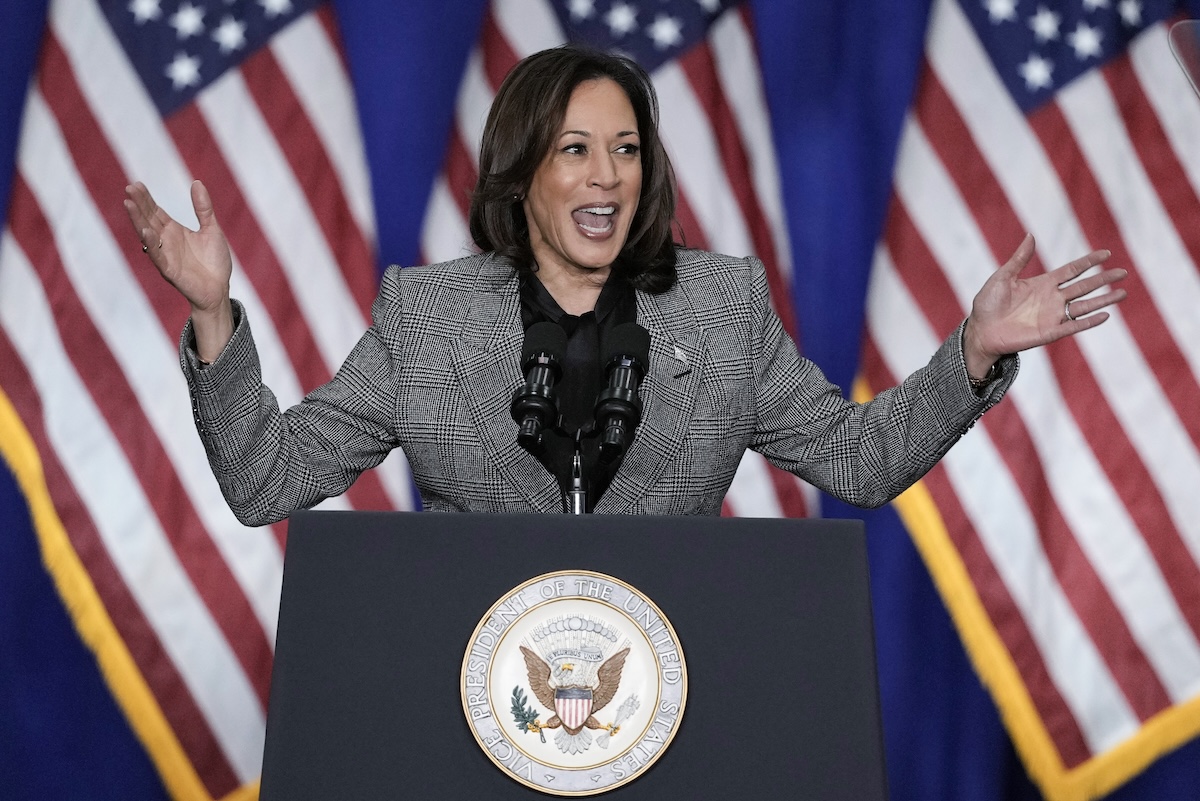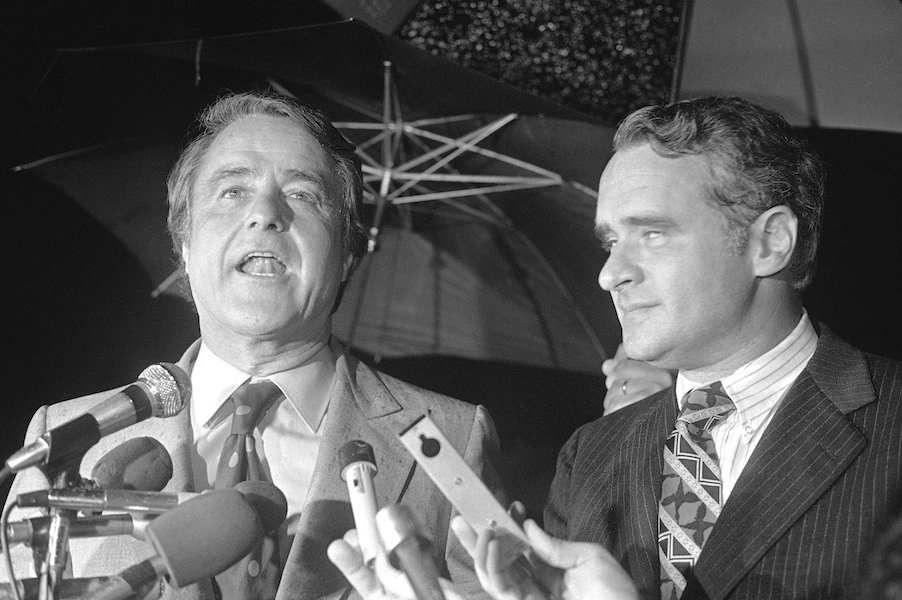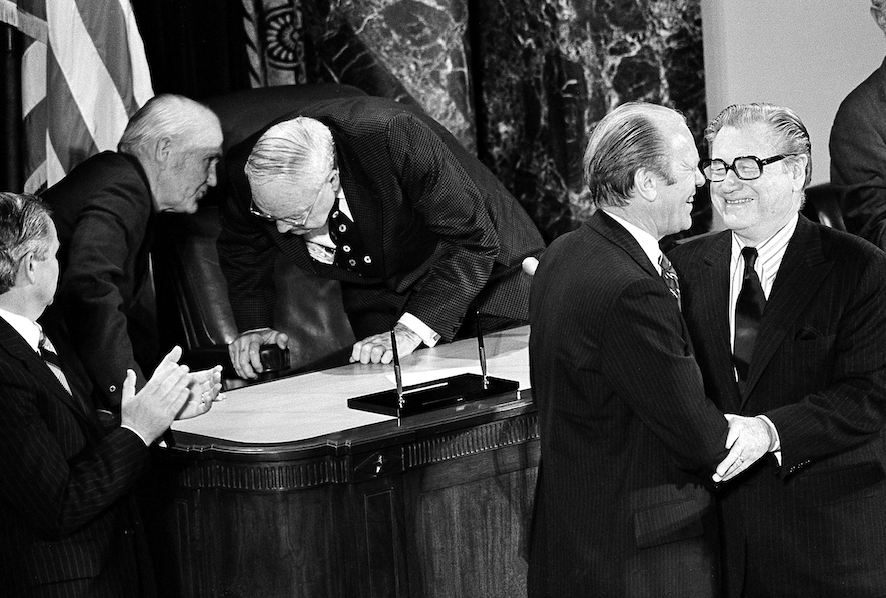Stand up for the facts!
Our only agenda is to publish the truth so you can be an informed participant in democracy.
We need your help.
I would like to contribute

Karla Ortiz, 11, of Las Vegas, dives into balloons on the floor after the Democratic National Convention in Philadelphia on July 29, 2016. (AP)
The available evidence suggests Joe Biden and Donald Trump will face each other for the presidency in November.
They are 81 and 77 years old, respectively. Trump is facing up to four criminal trials that could theoretically land him in prison. Also, some states are trying to keep Trump off their ballots for his role in the Jan. 6, 2021, Capitol attack, although the Supreme Court seems unlikely to let the states do that.
So, what happens if one of the major party’s presidential tickets opens up before inauguration day?
It depends heavily on timing.
"The process to replace a nominee, presumptive or otherwise, gets less messy the closer it gets to the convention," said Josh Putnam, a political scientist specializing in delegate selection rules and founder of the political consulting company FHQ Strategies LLC. The Republican convention is scheduled for Milwaukee in mid-July; the Democratic convention is slated for Chicago in late August.
Sign up for PolitiFact texts
Complicating matters for the Republicans is that Trump’s trial schedules are in flux, except for the New York trial over alleged hush-money payments to adult film actor Stormy Daniels, which is set to begin March 25.
Here’s a rundown of potential scenarios.
Democratic nominee Dean Phillips? Not so fast. (Louis Jacobson/PolitiFact)
During the primary process
The primary process has started for both parties. Most states have a primary to allocate delegates to each party’s national convention, at which the presidential nominee is formally selected. In a few states, parties opt instead for caucuses, which are typically in-person gatherings rather than ballots cast at polling places or through the mail.
So far, only a few states have allocated delegates. Officially, the primaries run through June, although the single biggest haul of delegates, a collection of contests known as Super Tuesday, will run March 5. One candidate from each party could have enough delegates to mathematically seal their nominations by the end of March.
Neither Biden nor Trump has the field to themselves yet. The most prominent opponent Biden faces is Rep. Dean Phillips of Minnesota; Trump continues to spar with former South Carolina Gov. Nikki Haley.
Nevertheless, Biden and Trump are considered overwhelming favorites to secure their parties’ nominations.
For both parties’ candidates, amassing delegates now helps secure their power and, if they are off the ticket, their legacy.
"Trump is attempting to get through all of the primary season in order to snatch up as many delegates as possible to buttress his case against being replaced," Putnam said. "The more delegate slots a candidate like Biden or Trump is able to fill lends some certainty to who the delegates who will vote on a nominee at the national convention will be."
Vice President Kamala Harris speaks at the International Union of Painters and Allied Trades District Council 7 in Big Bend, Wis., on Jan. 22, 2024. (AP)
The period between the end of primaries and the start of conventions
After the primary season is effectively over and before the the party conventions finish, delegates would play the decisive role if a nominee leaves the ticket. All told, the Republicans will have about 2,400 delegates; the Democrats will have around 4,700. The GOP will meet July 15-18; the Democrats will meet Aug. 19-22.
If Biden or Trump couldn’t proceed with the nomination during the pre-convention period, candidates left standing, such as Haley for the Republicans, could argue that their second-place finish justifies making them the nominee. But this argument would hardly be a slam dunk, because the delegates allocated during the primary process could choose someone else with wider support within the party.
"Trump-selected delegates are likely to settle on someone in the Trump vein, rather than someone like Mitt Romney or Nikki Haley," Putnam said. "A lively debate could take place among those vying for the nomination at the convention, but it may occur in a narrow ideological band."
Similarly, the delegates Biden collected and appointed would likelier back a Biden-style establishment Democratic nominee than a more liberal option. This is especially true because a portion of Democratic delegates are known as "superdelegates" who earn their status from holding an elected or appointed position within the party. Historically, superdelegates are assumed to prefer establishment candidates rather than insurgents.
Biden could amass the majority of delegates and then, on the eve of the convention, forgo running and urge his delegates to vote for a candidate he chooses or follow their consciences.
Any vacancy that leaves an unsettled convention, rather than one that’s carefully choreographed, as has been standard in recent decades, could become a political show for the ages, with furious backroom lobbying to secure delegate support.
If Biden were to die in office (or be made to relinquish the presidency because of incapacity under the 25th Amendment), Vice President Kamala Harris would become the incumbent president. In this scenario, it would be hard to envision Democratic delegates blocking her from the nomination, but it’s possible.
Vice Presidential candidate Sargent Shriver with Sen. Thomas Eagleton, the man he replaced on the Democratic ticket, on Sept. 7, 1972 at St. Louis airport. (AP)
Between the end of the convention and Election Day
If Biden or Trump were approved as the nominee at the convention but had to leave the ticket before Election Day, the parties would follow different rules.
On the Democratic side, the rules empower the Democratic National Committee to name a replacement. The Democrats would not have to name the vice presidential running mate as the replacement atop the ticket, but it would be considered the most likely option. That would make Harris the nominee, assuming she wanted to.
If Harris were elevated, the same process would determine the new vice presidential nominee. This happened in 1972, when the DNC named Sargent Shriver as the vice presidential nominee after Missouri Sen. Thomas Eagleton left the ticket following revelations about his mental health.
The Republican rules are murkier. A reconvening of the national convention is possible, but the Republican National Committee could probably find an alternative mechanism, Putnam said. Regardless, "it would not be as clean or as clear a move as the process on the Democratic side," Putnam said.
An additional complication for both parties is that delegates are allocated by primary and caucus results, but the candidate who wins them still must officially name the people to fill those delegate slots. That takes time and it’s possible that not all delegate slots would be filled by the time a nominee changed suddenly.
"State parties would be empowered to name those delegates in the absence of the two likely nominees," Putnam said. "That arguably could lead to a more chaotic national convention."
The completion of delegate selection with a convention of mostly Biden or Trump delegates "would tamp down on some of the crazier or messier outcomes," he said.
President Gerald Ford congratulates newly confirmed Vice President Nelson A. Rockefeller, right, after he was sworn-in on the Senate floor on Dec. 19, 1974. (AP)
Between the election of a president and their inauguration
If a new president is elected but dies before inauguration, the duly elected vice president would become the next president. A new vice president to serve alongside the newly elevated president would need to be approved by the Senate and the House, as happened when Congress approved Nelson Rockefeller after Gerald Ford took over for Richard Nixon, who had resigned amid the Watergate scandal.
In the case of an incumbent president who won another term, such as Biden if he wins this fall, Harris would become president immediately because she is an incumbent, too.
There’s still room for more wackiness. According to The Washington Post, if the winner dies between when the electoral votes are cast and when Congress counts them Jan. 6, 2025, it’s not entirely clear what would happen, even for the National Archives and Records Administration, whose job it is to know.
"We don’t know what would happen" in that scenario, the agency says on its website.
Our Sources
Congressional Research Service, Presidential Succession: Perspectives and Contemporary Issues for Congress, July. 14, 2020
Cornell University, 25th Amendment, accessed Feb. 15, 2024
Democrats.org, CALL For the 2024 Democratic National Convention, accessed Feb. 15, 2024
Republican National Convention, The Rules of the Republican Party, August 24, 2020
The Washington Post, What if November’s likely Biden-Trump rematch suddenly isn’t?, Feb. 9, 2024
The Washington Post, "What happens if Trump or Biden can no longer run for president?" February 14, 2024
Politico, Democrats Might Need a Plan B. Here’s What It Looks Like, Feb. 12, 2024
ABC News, What if Biden or Trump suddenly leaves the 2024 race?, Jan. 8, 2024
CNN, What happens if a presidential candidate dies or has to leave the race?, Feb. 12, 2024
Politico, Supreme Court Shocker? Here’s What Happens if Trump Gets Kicked Off the Ballot, Feb. 5, 2024
NBC News, How the Constitution could — or could not — keep Trump off the 2024 ballot, Feb. 7, 2024
PolitiFact, U.S. Supreme Court hears arguments on removing Donald Trump from ballot. Here’s what to know, Feb. 8, 2024
The New York Times, Judge Sets a March 25 Trial for Trump’s Criminal Hush-Money Case, Feb. 15, 2024
Email interview with Josh Putnam, political scientist specializing in delegate selection rules and founder of the political consulting firm FHQ Strategies LLC, Feb. 14, 2024





























